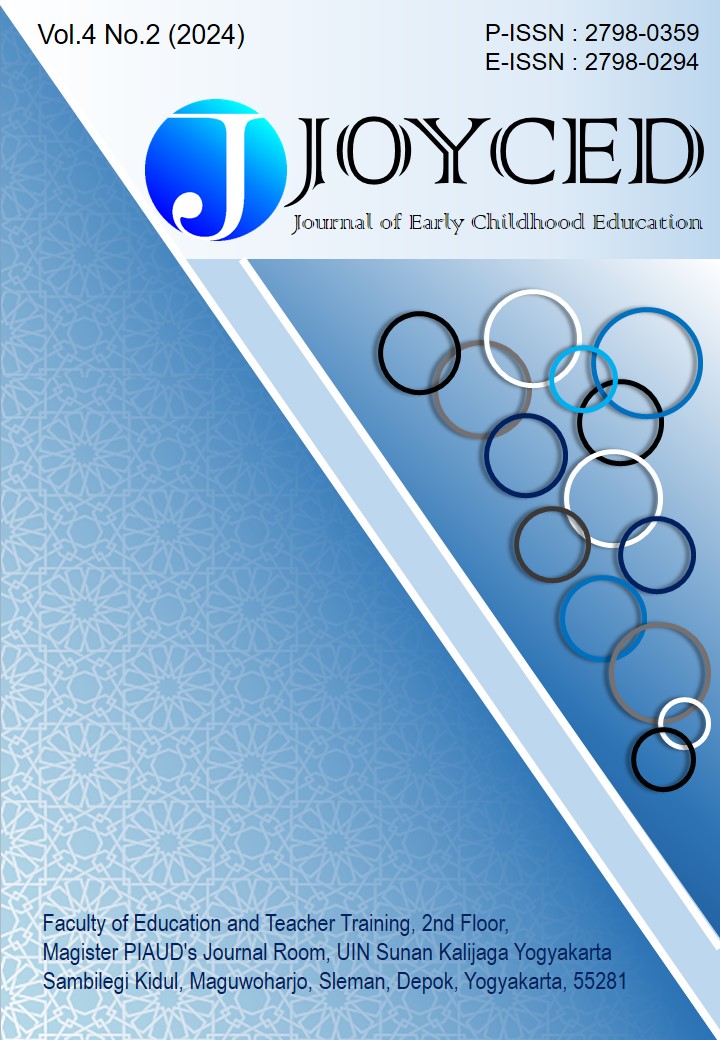The Influence of Digital Literacy on The Social Behavior of Early Childhood
DOI:
https://doi.org/10.14421/joyced.2024.42-09Keywords:
Early Childhood, Digital Literacy, Social BehaviorAbstract
This study was conducted against the background of children's social behavior which is currently experiencing a decline. Unconsciously, we have now entered a disruptive era where everyone is starting to use the digital world in their daily lives. The predictor that is thought to be able to predict children's social behavior is digital literacy. Therefore, this study tests and analyzes the influence of digital literacy on the social behavior of early childhood. The purpose of this study was to determine the influence of digital literacy on the social behavior of early childhood using this quantitative research method. The researcher studied 20 samples of early childhood in the Pedukuhan Canden, Canden, Jetis, Bantul area. The technique used was a correlation design, then the collected data was analyzed using comparative analysis with the help of SPSS 2.3 For Windows. The conclusion in this study is based on the results of the study, namely the results obtained 0.005 <0.05, it can be said that the data has a relationship between digital literacy and the social behavior of early childhood. With a person value of 0.599 > rtable 0.444, it can be concluded that digital literacy is positively related to the social behavior of early childhood with a sufficient degree of correlation, which means that there is an influence of digital literacy on the social behavior of early childhood in Pedukuhan Canden, Canden, Jetis, Bantul. The implication of the results of this study is the importance of developing digital literacy in early childhood as an effort to improve and enhance their social interactions. With better digital literacy, children are expected to be able to use technology wisely, which not only enriches their knowledge but also improves their social skills. Therefore, it is important for parents, educators, and related parties to provide appropriate learning regarding the use of technology that supports children's social development.
References
A’yuni, Q. Q. (2015). Literasi Digital Remaja Di Kota Surabaya. Jurnal Fakultas Ilmu Sosial Dan Ilmu Politik Universitas Airlangga Surabaya, 4(2), 1–15. http://journal.unair.ac.id/literasi-digital-remaja-di-kota-surabaya-article-9195-media-136-category-8.html
Ahmad, S. (2015). Bimbingan dan Konseling di Taman Kanak-Kanak. Prenada Media Group.
Ahmadi Abu. (1999). Psikologis Sosial. Rhineka Cipta.
Al Umairi, M., Suyadi, & Naimah. (2021). Meningkatkan kecerdasan musik anak melalui media gadget berbasis aplikasi ( games music ). Seling: Jurnal Program Studi PGRA, 7(1), 44–53. http://jurnal.stitnualhikmah.ac.id/index.php/seling/index
Andi, M. (1982). Psikologi Remaja. Usaha Nasional.
Arifin B. (2015). Psikologi Sosial. Pustaka Setia.
Cahyani, R., & Suyadi, S. (2018). Konsep Pendidikan Anak Usia Dini Menurut Ki Hadjar Dewantara. Golden Age: Jurnal Ilmiah Tumbuh Kembang Anak Usia Dini, 3(4), 219–230.
Candra, Puspita, & Adiyani. (2013). Penggunaan Internet Pada Anak- Anak Sekolah Usia 6-12 Tahun. Jurnal UNAIR, 1(1).
Cankaya, O., Rohatyn-Martin, N., Leach, J., Taylor, K., & Bulut, O. (2023). Preschool children’s loose parts play and the relationship to cognitive development: A review of the literature. Journal of Intelligence, 11(8), 151.
Choo, S. (2004). Investigating Ideology in the Literature curriculum in Singapore. Unpublished Master’s Thesis. Department of English Language and Literature: National University of Singapore.
David, B. (2006). Defining Digital Literacy, What do young people need to know about digial media. Digital Kompetanse Nordic Journal of Digital Literacy, 1.
Day, V. M., & Qodariah, S. (2018). Menumbuhkan Literasi Digital Pada Anak Usia Sekolah 6-12 Tahun. Prosiding Nasional Psikologi 2, 1–9.
Díaz-Burgos, A., García-Sánchez, J.-N., Álvarez-Fernández, M. L., & de Brito-Costa, S. M. (2023). Psychological and educational factors of digital competence optimization interventions pre-and post-covid-19 lockdown: A systematic review. Sustainability, 16(1), 51.
Eva, L. (2019). Strategi Pengenalan Potensi Anak. FUADUNA : Jurnal Kajian Keagamaan Dan Kemasyarakatan, 2(2), 86. https://doi.org/10.30983/fuaduna.v2i2.2069
Fatimah. (2020). Digital Literacy and Its Relationship to Early Childhood Behavior in PAUD. Kanal: Jurnal Ilmu Komunikasi, 9(1), 28–32. https://doi.org/10.21070/kanal.v9i1.663
Ghufron, G. (2018). Revolusi Industri 4.0: Tantangan, Peluang, Dan Solusi Bagi Dunia Pendidikan. Seminar Nasional Dan Diskusi Panel Multidisiplin Hasil Penelitian Dan Pengabdian Kepada Masyarakat 2018, 1(1), 332–337.
Hasanah, N., & Drupadi, R. (2020). Perilaku Prososial Anak selama Pandemi Covid-19. BUANA GENDER : Jurnal Studi Gender Dan Anak, 5(2), 97–107. http://ejournal.iainsurakarta.ac.id/index.php/buana-gender/article/view/2819
Hobbs, R., & Coiro, J. (2019). Design Features of a Professional Development Program in Digital Literacy. Journal of Adolescent and Adult Literacy, 62(4), 401–409. https://doi.org/10.1002/jaal.907
Hui, Z., & Chang, Z. (2016). A Study of Digital Media Literacy of the 5th and 6th Grade Primary Students in Beijing. The Asia-Pacific Education Researcher, 25(4).
Ichsan Emrald Alamsyah. (2020). Pakar Ingatkan Pentingnya Tumbuhkan Literasi Digital Pada Anak. Republika.Co.Id. https://republika.co.id/berita/qe4xcv349/pakar-ingatkan-pentingnya-tumbuhkan-literasi-digital-anak
Ismaniar, I., & Utoyo, S. (2020). “Mirror of Effect” dalam Perkembangan Perilaku Anak pada Masa Pandemi Covid 19. Diklus: Jurnal Pendidikan Luar Sekolah, 4(2), 147–157. https://doi.org/10.21831/diklus.v4i2.32429
Kazakoff, E. R. (2014). Toward a Theory-Predicated Definition of Digital Literacy for Early Childhood. Journal of Youth Development, 9(1), 41–58. https://doi.org/10.5195/jyd.2014.71
Kewalramani, S., Arnott, L., & Dardanou, M. (2020). Technology-integrated pedagogical practices: a look into evidence-based teaching and coherent learning for young children. European Early Childhood Education Research Journal, 28(2), 163–166. https://doi.org/10.1080/1350293X.2020.1735739
Kusuma, W. S., & Sutapa, P. (2020). Dampak Pembelajaran Daring terhadap Perilaku Sosial Emosional Anak. Jurnal Obsesi : Jurnal Pendidikan Anak Usia Dini, 5(2), 1635–1643. https://doi.org/10.31004/obsesi.v5i2.940
Mar’at. (1981). Sikap Manusia Perubahan dan Pengukurannya. Ghalia Indonesia.
Mutiani, R., & Suyadi. (2020). Diagnosa Diskalkulia Generasi Alpha: Masalah dan Perkembangannya. Edumaspul: Jurnal Pendidikan, 4(1), 104–112.
Ngalim, P. (1996). Psikologi Pendidikan. Remaja Karya.
Pebriana, P. H. (2017). Analisis Penggunaan Gadget terhadap Kemampuan Interaksi Sosial pada Anak Usia Dini. Jurnal Obsesi : Jurnal Pendidikan Anak Usia Dini, 1(1), 1–11. https://doi.org/10.31004/obsesi.v1i1.26
Pratama, D. A. N. (2019). Tantangan Karakter Di Era Revolusi Industri 4.0 Dalam Membentuk Kepribadian Muslim. Al-Tanzim : Jurnal Manajemen Pendidikan Islam, 3(1), 198–226. https://doi.org/10.33650/al-tanzim.v3i1.518
Ramadhani, I. R., Fathurohman, I., & Fardani, M. A. (2020). Efek Penggunaan Smartphone Berkelanjutan pada Masa Pandemi Covid-19 terhadap Perilaku Anak. Jurnal Amal Pendidikan, 1(2), 96–105.
Rihlah, J., Shari, D., & Anggraeni, A. R. (2021). Dampak Penggunaan Gadget di Masa Pandemi Covid-19 Terhadap Perkembangan Bahasa dan Sosial Anak Usia 5-6 Tahun. 5(1), 45–55.
S, M. (1997). Metodologi Penelitian Pendidikan. Rineka Cipta.
Santrock, J. W. (2007). Children ninth Edition. Mc Graw Hill.
Setyaningsih, R., Abdullah, A., Prihantoro, E., & Hustinawaty, H. (2019). Model Penguatan Literasi Digital Melalui Pemanfaatan E-Learning. Jurnal ASPIKOM, 3(6), 1200. https://doi.org/10.24329/aspikom.v3i6.333
Singer-Califano, A. (2008). The Use Of Technology In Enhancing Social Skills. I-Manager Journal on Educational Psychology, 1(4), 1–7.
Stewart, M. G. (2012). (Alih Bahasa Suci Romadhona), Dasar-dasar Pendidikan Anak Usia Dini (5th ed.). Indeks.
Sugiyono. (2013). Metode Penelitian Kuantitatif, Kualitatif, dan R&D. Alfabeta.
Sugiyono. (2015). Metode Penelitian Pendidikan. Alfabeta.
Sugiyono. (2016). Metode Penelitian Kuantitatif dan R&D. Alfabeta.
Sukiman. (2016). Menjadi Keluarga Hebat dalam Keluarga. Kementrian Pendidikan dan Kebudayaan.
Suyadi. (2011). Pentingnya Membangun Karakter Sejak Usia Dini Agar Berdaya Saing Global. Al-Bidayah, 3(2), 123–139. https://jurnal.albidayah.id/index.php/home/index
Suyadi, S. (2017). Perencanaan dan Asesmen Perkembangan Pada Anak Usia Dini. Golden Age: Jurnal Ilmiah Tumbuh Kembang Anak Usia Dini, 1(1), 65–74. http://ejournal.uin-suka.ac.id/tarbiyah/index.php/goldenage/article/view/1251
Syaifudin, A. (2012). Penyusunan Skala Psikologi. Pustaka Pelajar.
Trianto. (2011). Pengembangan Pembelajaran Tematik Bagi Anak Usia Dini TK/RA & Anak Usia Kelas Awal SD/MI. KENCANA.
Undang-Undang Nomor 20 Tahun 2003 tentang Sistem Pendidikan Nasional. (n.d.).
Uswatun Khasanah, & Herina. (2019). Membangun Karakter Siswa Melalui Literasi Digital Dalam Menghadapi Pendidikan Abad 21 (Revolusi Industri 4.0). Prosiding Seminar Nasional Pendidikan Program Pascasarjana Universitas Pgri Palembang, 21, 999–1015.
Wirawan, S. S. (1982). Pengantar Ilmu Psikologi. Bulan Bintang.
Wiwien, D. P. (2008). Psikologi Anak Usia Dini. PT Indeks.






.png)











